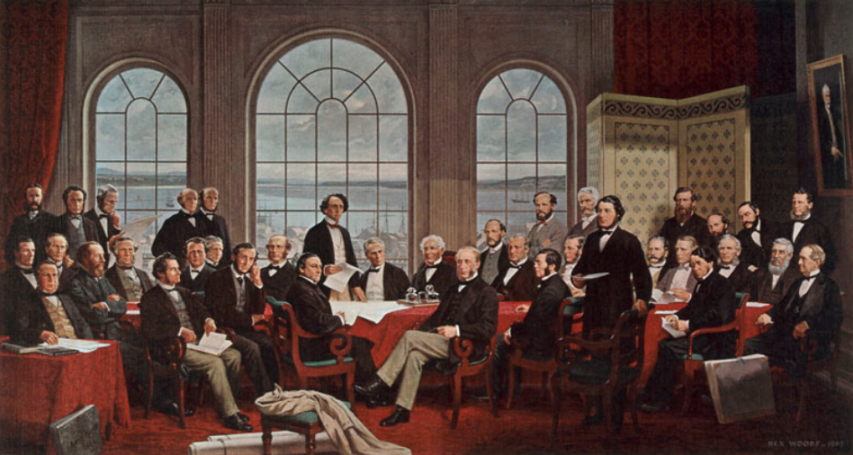Ted Campbell suggests that even a cursory reading of the constitution does not give the federal government the power to trespass (again) in what is clearly, legally, a provincial government area of responsibility:

“The Fathers of Confederation”
The original painting by Robert Harris (1884) was destroyed in the 1916 Parliament Building fire, and this image for the “Gallery of Canadian History” series of lithographs by Confederation Life Insurance Company is based on a photograph by James Ashfield (1885).
Libraries and Archives Canada item ID number 3013194. http://central.bac-lac.gc.ca/.redirect?app=fonandcol&id=3013194&lang=eng
[T]he Parliament of Canada should look to §91. Here is what the Constitution says are the areas of national government’s concern: The Public Debt and Property; The Regulation of Trade and Commerce; Unemployment insurance; The raising of Money by any Mode or System of Taxation; The borrowing of Money on the Public Credit; Postal Service; The Census and Statistics; Militia, Military and Naval Service, and Defence; The fixing of and providing for the Salaries and Allowances of Civil and other Officers of the Government of Canada; Beacons, Buoys, Lighthouses, and Sable Island; Navigation and Shipping; Quarantine and the Establishment and Maintenance of Marine Hospitals; Sea Coast and Inland Fisheries; Ferries between a Province and any British or Foreign Country or between Two Provinces; Currency and Coinage; Banking, Incorporation of Banks, and the Issue of Paper Money; Savings Banks; Weights and Measures; Bills of Exchange and Promissory Notes; Interest; Legal Tender; Bankruptcy and Insolvency; Patents of Invention and Discovery; Copyrights; Indians, and Lands reserved for the Indians; Naturalization and Aliens; Marriage and Divorce; The Criminal Law, except the Constitution of Courts of Criminal Jurisdiction, but including the Procedure in Criminal Matters; The Establishment, Maintenance, and Management of Penitentiaries; and Such Classes of Subjects as are expressly excepted in the Enumeration of the Classes of Subjects by this Act assigned exclusively to the Legislatures of the Provinces.
In that looooong list I can find more than adequate justifications for ministers and government departments that are responsible for: finance and revenue; industry, trade, and commerce; defence; foreign affairs; transport; fisheries and oceans; citizenship and immigration; health; and for independent agencies like the Bank of Canada, Canada Post and Statistics Canada. I cannot find anything that says we need a Minister for Women and Gender Equality, nor one for Diversity, Inclusion and Youth nor, especially, Ministers for Canadian Heritage and Middle Class Prosperity.
A lot of things have changed since 1867; the telegraph was still fairly new and innovative, a practical telephone wouldn’t be invented until ten years after confederation and the first useful long-haul radio transmission and reception, from Britain to Signal Hill in St John’s didn’t come until the dawn of the 20th century, thus ideas like the CBC, the Internet, Netflix, air traffic control and the North Warning System were far beyond the imagination of the men ~ they were pretty much all men, working in government, back in the 1860s, weren’t they? ~ who drafted the Canadian Constitution.
What was clear to them, based on the United States experiences, was that §90 to §95 which spell out “who does what to whom” were important to the functioning of a federal state, especially to one in which traditional provincial rights and diverse cultures were well established. Now, it is important to remember that in Canada’s long and rich history there were instances, especially during great wars, when the provinces agreed to federal intrusions into their areas of responsibility; this is not one long story of federal bullying. But what seems perfectly clear to me ~ and I suspect to e.g. John Horgan, Jason Kenney, Doug Ford, François Legault and the other premiers is that last week’s Throne Speech marks another major and quite unjustified federal assault on their jurisdictions. What’s happened, according to Manitoba Premier Brian Pallister, is that the provinces have all the health care delivery problems but, thanks, in some part, to tax decisions made in 1942, the feds have all the money. The solution is blindingly obvious: transfer tax “points” as some experts call them, to the provinces so that they, not Justin Trudeau, who have the problems of too few physicians, too few nurses and too few hospital beds also have the money to solve them.









